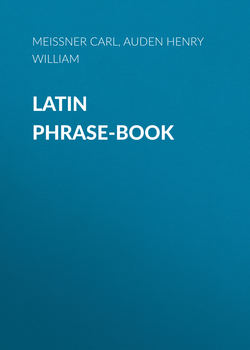Читать книгу Latin Phrase-Book - Auden Henry William - Страница 10
II. Space and Time
8. Time in General
Оглавлениеtempus praeterit, transit– time passes.
tempus habere alicui rei– to have time for a thing.
tempus mihi deest ad aliquid faciendum– I have no time to do something.
tempus consumere in aliqua re– to pass one's time in doing something.
tempus terere, conterere (in) aliqua re– to waste time on something.
tempus conferre ad aliquid– to employ one's time in…
tempus tribuere alicui rei– to devote time to anything.
tempus non amittere, perdere– to lose no time.
nullum tempus intermittere, quin (also ab opere, or ad opus) – to devote every spare moment to…; to work without intermission at a thing.
tempus ducere– to spend time.
aliquid in aliud tempus, in posterum differre– to put off till another time; to postpone.
nihil mihi longius est or videtur quam dum or quam ut– I cannot wait till…
nihil mihi longius est quam (c. Inf.) – nothing is more tiresome to me than…
tempus (spatium) deliberandi or ad deliberandum postulare, dare, sibi sumere– to require, give, take time for deliberation.
paucorum dierum spatium ad deliberandum dare– to give some one a few days for reflection.
tempori servire, 28 cedere– to accommodate oneself to circumstances.
ex quo tempore or simply ex quo– since the time that, since (at the beginning of a sentence).
eo ipso tempore, cum; tum ipsum, cum– at the same moment that, precisely when.
incidunt tempora, cum– occasions arise for…
tempus (ita) fert (not secum) – circumstances demand.
tempus maximum est, ut– it is high time that…
haec tempora, nostra haec aetas, memoria– the present day.
his temporibus, nostra (hac) aetate, nostra memoria, his (not nostris) diebus– in our time; in our days.
nostra aetas multas victorias vidit– our generation has seen many victories.
memoria patrum nostrorum– in our fathers' time.
aetate (temporibus) Periclis– in the time of Pericles.
antiquis 29 temporibus– in old days, in the olden time.
libera re publica– in the time of the Republic.
tempora Caesariana– the imperial epoch.
media quae vocatur aetas– the middle ages.
Pericles summus vir illius aetatis– Pericles, the greatest man of his day.
Pericles, quo nemo tum fuit clarior– Pericles, the greatest man of his day.
Pericles, vir omnium, qui tum fuerunt, clarissimus– Pericles, the greatest man of his day.
vir ut temporibus illis doctus– a man of considerable learning for those times.
tempore progrediente– in process of time.
primo quoque tempore– at the first opportunity.
hoc tempore– at this moment.
puncto temporis– in an instant.
momento 30 temporis– at the important moment.
in ipso discrimine (articulo) temporis– just at the critical moment.
temporis causa– on the spur of the moment.
ad tempus 31 adesse– to be there at a given time.
ad exiguum tempus– for a short time.
brevis or exigui temporis– for a short time.
satis longo intervallo– after a fairly long interval.
spatio temporis intermisso– after some time.
in praesentia, in praesens (tempus)– at present; for the moment.
in posterum; in futurum– for the future.
in perpetuum– for ever.
semel atque iterum; iterum ac saepius; identidem; etiam atque etiam– more than once; repeatedly.
futura providere (not praevidere) – to foresee the future.
futura or casus futuros (multo ante) prospicere– to foresee the far distant future.
futura non cogitare, curare– to take no thought for the future.
saeculi 32 consuetudo or ratio atque inclinatio temporis (temporum)– the spirit of the times, the fashion.
his moribus– according to the present custom, fashion.
28
The verb servire helps to form several phrases, e.g. servire valetudini, to be a valetudinarian; iracundiae, to be unable to restrain one's anger; brevitati, to be concise; communi utilitati, to be devoted to the public good, etc.
29
antiquitas = the state of affairs in times gone by, not a division of time; so antiquitatis studia, archaeology; veteres or antiqui poetae, populi, the poets, people of antiquity; antiqua monumenta, the relics of antiquity. antiquitates plur. is used for the institutions, usages of times gone by.
30
momentum (i.e. movimentum) is properly that which sets in motion, which gives a decisive impulse to things, cf. Luc. iv. 819, momentumque fuit mutatus Curio rerum. Livy and later writers employ the word in the sense of a moment of time.
31
ad tempus also means (1) according to the circumstances of the case, e.g. ad tempus consilium capere, (2) for a short time, temporarily.
32
The spirit of a thing is usually rendered by such words as natura, proprietas, ratio atque voluntas, e.g. the spirit, genius of a language, natura or proprietas sermonis; the spirit of the laws, voluntas et sententia legum.
